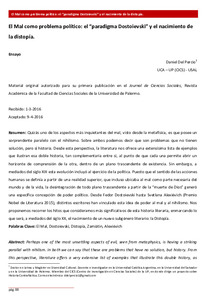Por favor, use este identificador para citar o enlazar este ítem:
https://repositorio.uca.edu.ar/handle/123456789/14165| Título: | El Mal como problema político : el “paradigma Dostoievski” y el nacimiento de la distopía | Autor: | Del Percio, Daniel | Palabras clave: | DISTOPIA; MAL; NIHILISMO; PODER POLITICO; HISTORIA LITERARIA; Dostoyevski, Fiodor, 1821-1881; Alexiévich, Svetlana, 1948-; GENEROS LITERARIOS | Fecha de publicación: | 2016 | Editorial: | Universidad de Palermo. Facultad de Ciencias Sociales | Cita: | Del Percio, D. El Mal como problema político : el “paradigma Dostoievski” y el nacimiento de la distopía [en línea]. Journal de Ciencias Sociales. 2016, 4 (6). Disponible en: https://repositorio.uca.edu.ar/handle/123456789/14165 | Resumen: | Resumen: Quizás uno de los aspectos más inquietantes del mal, visto desde la metafísica, es que posee un sorprendente paralelo con el nihilismo. Sobre ambos podemos decir que son problemas que no tienen solución, pero sí historia. Desde esta perspectiva, la literatura nos ofrece una extensísima lista de ejemplos que ilustran esa doble historia, tan complementaria entre sí, al punto de que cada una permite abrir un horizonte de comprensión de la otra, dentro de un plano trascendente de existencia. Sin embargo, a mediados del siglo XIX esta evolución incluyó al ejercicio de la política. Puesto que el sentido de las acciones humanas se definía a partir de una realidad superior, que incluso ubicaba al mal como parte necesaria del mundo y de la vida, la desintegración de todo plano trascendente a partir de la “muerte de Dios” generó una específica concepción de poder político. Desde Fedor Dostoievski hasta Svetlana Alexiévich (Premio Nobel de Literatura 2015), distintos escritores han vinculado esta idea de poder al mal y al nihilismo. Nos proponemos recorrer los hitos que consideramos más significativos de esta historia literaria, enmarcando lo que será, a mediados del siglo XX, el nacimiento de un nuevo subgénero literario: la Distopía. Abstract: Perhaps one of the most unsettling aspects of evil, seen from metaphysics, is having a striking parallel with nihilism. In both we can say that these are problems that have no solution, but history. From this perspective, literature offers a very extensive list of examples that illustrate this double history, as complementary to each other, to the point that each opens a horizon of understanding of the other within a transcendent plane of existence. However, the mid-nineteenth century this evolution included the exercise of politics. Since the meaning of human actions are defined from a higher reality, even it defined as a necessary evil in the world and life, the disintegration of all transcendent plane from the "death of God" generated a conception of political power. From Fyodor Dostoevsky to Svetlana Alexievich (Nobel Prize 2015), various writers have linked this idea to evil and nihilism. We intend to go that we consider the most significant milestones of this literary history, framing what will be in the mid-twentieth century, the birth of a new literary subgenre: the Dystopia. |
Cobertura Temporal: | SIGLO XIX SIGLO XX |
URI: | https://repositorio.uca.edu.ar/handle/123456789/14165 | ISSN: | 2362-194X | Disciplina: | LITERATURA | Derechos: | Acceso abierto | Fuente: | Journal de Ciencias Sociales. 2016, 4 (6) |
| Aparece en las colecciones: | Artículos |
Ficheros en este ítem:
| Fichero | Descripción | Tamaño | Formato | |
|---|---|---|---|---|
| mal-como-problema-politico.pdf | 664,43 kB | Adobe PDF |  Visualizar/Abrir |
Este ítem está sujeto a una Licencia Creative Commons

